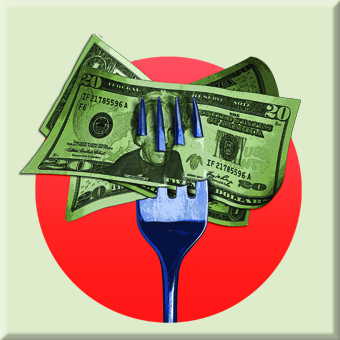The hungry of the world make an uncommonly good investment opportunity.
An online investment board hosts a lively chat among a gaggle of eager Wall Street wannabes who cheer and jeer each other through to a near consensus on a winning strategy. Nothing unusual about that. It's the nature of their specific strategy that's worth at least one Mr. Spock eyebrow raise. The fellas are trying to decide how to best profit from the coming future of food scarcity and hunger calamity.
Their investment model is pretty simple. The Green Revolution, that vast, experiment in high-input, chemical-reliant farming-launched in the United States in 1945 before infecting development strategies around the world-is running its course. Yields are declining; the soil is exhausted, propped up by fertilizers and pesticides that have pushed the fields of our Lord into an era of diminishing agricultural returns.
And neither, of course, is the main resource in farming, arable land, likely to increase as urban sprawl claims land that could have been used for food production. Meanwhile climate change is heating up droughts in previous pockets of food production.
Finally throw in an increasing global population with a growing taste for the protein-and fat-rich Western diet, and you've got all the ingredients necessary for a vast worldwide run on food banks and a concurrent profit opportunity. The impact of growing fuel-cornfields earmarked for ethanol, for example, instead of grocery shelves-remains unclear but is likely to put further pressure on overall global supply of food as crops are diverted to fuel production.
My online investing clique finds some support for their theory in a recent report from the United Nations Food and Agriculture Organization (FAO). According to the FAO, the ongoing global financial crisis may leave more than 1 billion people hungry in 2009 while the overall number of the world's hungry people will rise from 915 million in 2008 to just over 1 billion.
The FAO disagrees with my investment advisors only in the ultimate root of the great hunger. It argues that overall poverty engendered by the financial crisis will drive hunger in 2009, not food scarcity and increased demand.
In Caritas in Veritate (Charity in Truth) Pope Benedict XVI also notes the coming hunger crisis but draws a different conclusion about how to respond. In the new encyclical Benedict connects with decades of previous church teaching, arguing that the basics of life and human dignity, like adequate food and clean water, are the birthright of all humankind, not the commercial booty of the highest bidder, nor the reliable income generator for the adroit investor. Securing global peace and security are the collateral benefits, he adds, to a meaningful response to the moral imperative of feeding the hungry.
Last February Catholic Relief Services and other humanitarian agencies proposed a five-year plan for U.S. foreign aid programs on international hunger, nutrition, and rural and agricultural development, the Roadmap to End Global Hunger. There are current efforts before Congress (The Roadmap Act, H.R. 2817) to build that plan into a legislative package aimed at seriously-and one can only hope definitively-making the eradication of global hunger reality rather than rhetoric.
Personally I would hate to ruin this great opportunity for a big stock market payoff, but if these guys are able to find such mercantile clarity in their little crystal balls, shouldn't the rest of us figure out a way to cash in on famine futures as well? Of course our payoff would be a little different than the dollar signs dancing in these online eyes. We would be seeking to avoid such things as food riots, state meltdowns, widespread hunger, humiliation, suffering, affronts to human dignity, that sort of thing-even if it means losing out a little on a fast return on investment.
Perhaps U.S. food policy makers ought to reconsider their subsidy and distribution strategies for the next few years. Maybe bend food production policy a little away from fuel and overall scarcity and toward plenty enough for all. I know it will ruin the chances of my Wall Street friends from making a quick buck on hunger, but I've thought about it a little and I'm pretty sure I can live with that.














Add comment